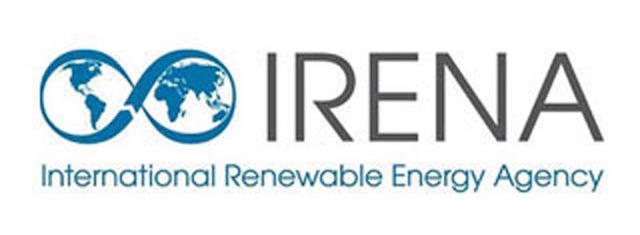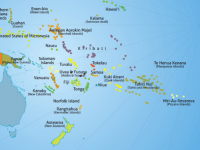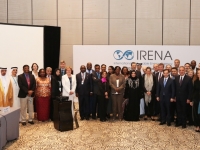Travel
FInding a way to transforrm Energy on Islands
According to IRENA

IRENA logo (Source: IRENA)
USPA NEWS -
Small Island Developing States are on the frontlines of global climate change.Dependent on the ocean for their livelihoods, yet threatened by its rising & acidifying waters, this assemblage of the world´s lowest lying countries are some of the most outspoken and driven countries for decarbonisation
Small Island Developing States (SIDS) are on the frontlines of global climate change. Dependent on the ocean for their livelihoods, yet threatened by its rising and acidifying waters, this assemblage of the world´s lowest lying countries are some of the most outspoken and driven countries for decarbonisation and renewable energy.-----------------------------------------------
Matching ambition with reality, however, is not simple, and SIDS need international support to accomplish their decarbonisation goals. But what does that support look like? What is needed to identify the best pathways for SIDS to achieve a renewable energy future and to establish the necessary frameworks for accessing financial support at the speed and scale required to transform their energy systems? “As SIDS continue their leadership in low-carbon development, we must ensure that this progress does not slow,“ said IRENA Director-General Adan Z. Amin at the opening of the meeting SIDS Lighthouses Initiative: Power Sector Transformation in SIDS, on 13 January 2017, preceding the opening of IRENA´s Assembly. “The transition towards an electricity system powered by renewables in SIDS is an achievable, but complex journey, with policy, regulatory, financial and technical challenges. IRENA launched the SIDS Lighthouses Initiative over two years ago as a framework for action for SIDS and partners to take a holistic and sustainable approach to energy transformation “” one that is cognizant of the immediate, medium and long-term requirements and impacts.“
Delegates were gathered at the meeting to provide updates from SIDS Lighthouses Initiative´s partners on support provided and progress made since the Paris Agreement was reached more than a year ago, and to identify areas where additional assistance will be needed to continue islands on their trajectory towards 100% clean energy. The meeting was also an opportunity for a higher-level discussion on the next phase of the SIDS Lighthouses Initiative and reducing SIDS´ dependence on fossil fuels. “Project size and scalability are key constraints for financing renewable energy projects in SIDS,“ says Jennifer DeCesaro, IRENA Senior Programme Officer focusing on SIDS. “Perceived risks undermine private sector finance and many islands have to rely on public funds and development assistance to expand the use of renewable energy. More than that, limited technical skills and regulatory schemes often act as barriers to the development of renewable energy resources.“-----------------------------------------------------------------------------------------------------------------------------------------
In many instances government ambitions face initial utility scepticism. Grid integration of variable renewables and the priority of keeping the lights on often emerges as a key point of discussion. “IRENA alongside its partners have assessed more than ten island grids in terms of immediate ability to deploy solar and wind as well as grid investment needs to enable higher variable renewable energy shares,“ says DeCesaro. She´s hopeful that SIDS can achieve their aims, “The results are very encouraging, and a recent study for Barbados showed a 76 per cent renewable generation share there would be technically and economically feasible.“
MATCHING A WILL IN A WAY--------------------------------------------------------------------------------------------------------------
At the meeting, IRENA shared its Lighthouse Initiative´s work, particularly how it is advising and supporting SIDS to achieve more than 120MW of new renewable energy deployment by 2020. The Initiative is helping to facilitate engagement with stakeholders to mobilize USD 500 million in additional financing. To enable governments and stakeholder organisations to prioritise and coordinate support towards accelerated renewable energy deployment, IRENA developed the Quickscan “” an initial assessment tool developed along seven elements critical to the successful deployment of renewables: institutional framework, knowledge base, planning, financing, deployment, capacity building, and cooperation.---------------------------------
“For all Island partners the Quickscan has served as a benchmark and baseline to continue tracking progress towards sustainable energy deployment,“ explains DeCesaro. “And to date, 38 Quickscans have been developed. They all clearly point out capacity building and bankability of project proposals as issues in a majority of cases. If we´re going to make SIDS sustainable, we need to make sure their projects are economically sustainable first.“Source IRENA
Irena Masdar City Abu Dhabi Renewable Energies Director General Adnan Amin President Ibrahim Saif Small Islands Dr. Amal Al Qubaisi Lawyers Signature Rahma Sophia Rachdi
Liability for this article lies with the author, who also holds the copyright. Editorial content from USPA may be quoted on other websites as long as the quote comprises no more than 5% of the entire text, is marked as such and the source is named (via hyperlink).







